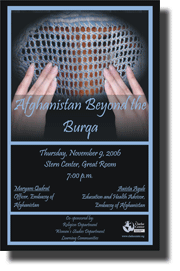Thursday, November 9, 2006
Afghanistan Beyond the Burqa
Stern Center, Great Room, 7:00 p.m.

Issue in Context
A free and compulsory education is viewed by many as one of the most fundamental of all human rights. However, at least 125 million worldwide children are denied basic education and one in three adults remain illiterate, according to the Global Campaign for Education.
Under the Taliban, basic education declined between 1996 and 2001, causing an increased percentage of illiteracy and low rate of school attendance. School curriculum was restricted, schools were destroyed and female education was banned. The government closed all of the girls’ schools in the country and prevented female teachers from working. Some girls were secretly educated in their homes by parents and teachers, others attended underground schools. In 2000, UNICEF reported that only 4% to 5% of Afghan children were being educated at the primary school level. Fewer had access to secondary and university education. By 2001, Afghanistan possessed one of the worst educational records in the world.
Since the Taliban fell from power in 2001, international efforts led by numerous countries negotiated an aid package of $4.5 billion to help rebuild Afghanistan. More than a million attend school in Afghanistan. Today, more girls attend school in Afghanistan than in the decade before the Taliban banned female education. Several hundred women have also taken the entrance exams required for admission to the University of Kabul .
The reconstruction of the Afghan educational system, however, is far from complete. There is a shortage of trained teachers at every level of education and there are still around 2 million students living in rural areas, many in refugee camps, who continue to be denied their right to education. Hostility toward girls’ education also continues.
Despite improvements, several questions must be asked: What is the current role of women in Afghanistan? What is the status of education in the country?
About the Speakers
Maryam Qudrat:
Maryam Qudrat is founder of the Afghan Institute for Development (AID) and author of Torn Between Two Cultures: An Afghan-American Woman Speaks Out. As a result of Qudrat’s knowledge on Afghanistan redevelopment, she has appeared on Paula Zahn’s NOW on CNN and was featured in the Los Angeles Times and TIME Magazine. Currently, she serves on the U.S. National Advisory Council on South Asian Affairs and as a board member of International Orphan Care(IOC). Qudrat is also a professor at California State University , Long Beach. As of April 2005, she has served as the Women’s Affairs and Social Institutions Officer in the Embassy of Afghanistan in Washington D.C.
Maryam Qudrat received a bachelor’s degree in business management from the University of Phoenix in 1997, a master’s degree in philosophy from California State University, Long Beach, and she is currently in the process of earning her doctorate in philosophy from the University of Southern California (USC).
Awista Ayub
Awista Ayub founded the Afghan Youth Sports Exchange, a non-profit organization dedicated to preparing Afghanistan’s youth with the leadership skills required to promote athletics in their schools and communities. Ms. Ayub has been featured in a number of national news publications and programs including ESPN, Glamour magazine and USA Today. Recently, Ayub was featured as an ABC News “Person of the Week.†Currently, Ms. Ayub serves as the education and health officer at the Embassy of Afghanistan in Washington, D.C. She is responsible for fostering relationships with organizations, schools, and individuals that work with education and health issues related to Afghanistan. In 2001, she received her bachelor’s degree in chemistry from the University of Rochester.
Related Links
The Embassy of Afghanistan, Washington, D.C.
